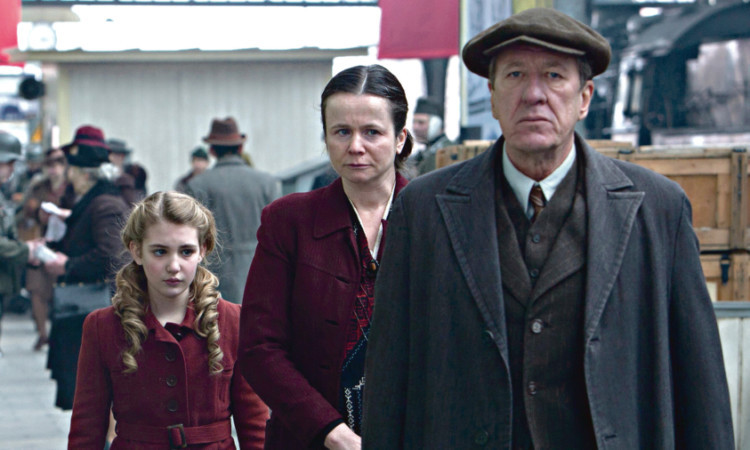
Dark drama plays on every parent’s worst nightmare.
“As you get older, you tend to get more complex roles to play,” Emily Watson tells The Sunday Post. “They’re a good challenge, but not always fun.”
The 47-year-old actress is giving fun a miss again in The Book Thief, which premieres at the Glasgow Film Festival tonight.
Based on Markus Zusak’s bestseller spending almost seven years on The New York Times most popular list it tells the story of an ordinary couple living in Nazi Germany who first foster the orphaned daughter of a Communist and then, after war is declared, hide a young Jewish man in their cellar.
Emily plays Rosa Hubermann, the prickly wife of good-natured Hans (played by Geoffrey Rush), a First World War veteran who is quietly disgusted at the actions of the Nazis and whose idea it is to make a discreet stand against them.
The book highlights the fact that, while many around them lost their heads when Hitler came to power, some 24,000 Germans are acknowledged to have aided Jews in some way in the lead up to and during the war, all at great risk to themselves.
“I found myself asking if I would endanger my children, who are five and eight, to save the life of a complete stranger,” says Emily, who has a son and daughter from her 18-year marriage to playwright Jack Waters.
“I hope I would, but I don’t know that for sure. You don’t often see the war from the point of view of ordinary Germans and for the majority of them, it wasn’t that they were evil, they were saving their own skins and not speaking up because they were afraid to.
“Rosa is perfect material for National Socialism at the beginning of the film. She’s very disappointed and bitter at the way her life has turned out.
“She married this wonderful, romantic, poetic figure, a musician and a painter who now sits around doing nothing while she’s washing other people’s dirty clothes by hand to put bread on the table.
“They’re fighting poverty and nothing in her life is as she imagined it would be and the Nazis are saying ‘come with us, we’ll make it all better’. And then a Jewish boy falls through their door and we find out what a decent and brave person she is.”
It’s the sort of film we’ve come accustomed to from the unassuming actress in recent years. She won a Bafta in 2012 for her portrayal of Janet Leach in Appropriate Adult, a volunteer social worker who was assigned to give legal advice to Fred West.
She was also nominated for the Australian equivalent of a Bafta for her performance as another social worker, Margaret Humphreys, in Oranges and Sunshine.
She will next be seen as Lady Mansfield in Belle, which is inspired by the true story of an illegitimate mixed-race daughter of a Royal Navy Admiral who is raised by her aristocratic great-uncle Lord Mansfield (Tom Wilkinson) and his wife. It’s due out at cinemas in June.
“I just find they’re interesting, complicated parts of life,” she says of her preference for true-story or fact-based roles.
“Appropriate Adult I found very difficult because as an actor you have to use your imagination, that’s your job, so I found myself having to imagine the fate of these people. I couldn’t get away from that job fast enough at the end of it.
“Oranges and Sunshine was different and The Book Thief was different again. We filmed it in Germany and so we were surrounded by a German cast and crew.
“You’re very aware that everybody’s grandparent lived through this.
“They must have had the same conversations at the kitchen table as the Hubermanns and the ones that weren’t as brave as them were the building blocks of an entire nation losing its moral code.”
The Book Thief is at cinemas from Wednesday.
Our Verdict
Markus Zusak’s novel is told from the point of view of Death, a humorous character who wants an end to the war so he can go on holiday. Brian Percival’s film adaptation attempts to honour this by employing Roger Allam as an omniscient narrator but that only succeeds in being an unnecessary distraction. It’s one of the main missteps of a sadly lightweight movie which acts as a conversation starter for what life for ordinary Germans must have been like between 1933-45 rather than the serious debating issue it should have been.
The Book Thief 3/5

Enjoy the convenience of having The Sunday Post delivered as a digital ePaper straight to your smartphone, tablet or computer.
Subscribe for only £5.49 a month and enjoy all the benefits of the printed paper as a digital replica.
Subscribe